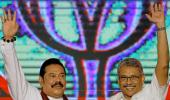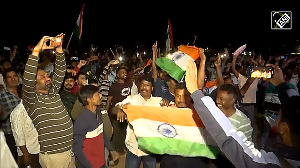New Delhi is approaching Gota with an open mind, observes N Sathiya Moorthy.

As is to be expected, Sri Lanka's new President Gotabaya Nandasena Rajapaksa's maiden overseas visit, to New Delhi, has come in for multiple interpretations at the hands of India's strategic community.
It used to be the case with his elder brother and predecessor once removed, President Percy Mahinda Rajapaksa, during his second term in office -- after he had successfully headed the nation in eliminating the LTTE with multiple conventional military capabilities.
India has had an open mind to the Gota election back home, and his subsequent Delhi visit. There was no jubilation of the kind that had attended that of predecessor Maithripala Sirisena -- or the attendant electoral defeat of incumbent Mahinda R, in elections 2005.
'Cautious optimism' is one way to put the Indian approach to the Gota presidency. The other way is to say that New Delhi is approaching Gota with an open mind.
The Rajapaksas cannot thank their predecessors, who comprised Sirisena and then prime minister Ranil Wickramesinghe enough, for making them acceptable to their own people first, and the larger Indian neighbour next. Mahinda's defeat five years ago had convinced them that you cannot antagonise India and hope to win their presidency, one way or the other.
The truth is that at the end of Mahinda's second term, the Rajapaksas had become unacceptable to a substantial section of their Sinhala-Buddhist majority community, after becoming so for the nation's three other (minority) ethnicities, namely, the war-victimised Sri Lankan Tamils, Tamil-speaking Muslims and upcountry Tamils of recent Indian origin (or, estate Tamils).
The Rajapaksas lost owing to three main factors. One, perceptions of 'democracy deficiency'; two, allegations of large-scale corruption; three, those perceptions that were half true and half created and propagated by social media, where they could not match up with their rivals, both nearer home and abroad.
A new generation of Sri Lankan youth looking for 'change' in the post-war scenario that they had heralded felt cheated. They came mostly from the new semi-urban households, which the earlier Rajapaksa regime had helped create, taking urbanisation beyond Colombo and other handful of places.
Having fed on their own construct that the southern Sinhala rural masses deserved better roads, electrification and the like even if the nation was at war with itself (or, with a part thereof), the Rajapaksas failed to take note that they had achieved it all at once.
They did not also notice that the new-generation rural youth, with greater job opportunities in the government sector, including the armed forces, also got greater exposure as an inevitable offshoot. They stayed on to pay the price when they failed to notice and refused to learn.
On the democracy front, the Rajapaksas committed two mistakes. One, they convinced themselves that development was a clear substitute for 'more democracy'. Two, having created a national psyche centred on 'war-time needs', including a pliant media and a cooperative population, they did not know how to climb down from the high hobby horse, post-war.
Their people, or a majority of the urban/newly urbanised segment, having cooperated with their one and only decisive and purposeful leadership on the LTTE score, had thought otherwise.
Today, if the Rajapaksas are back in power -- including ex-president Mahinda as prime minister now -- it again owes to the 'social media' generation from their defeated past. Their successors thought, and erringly so, that the Rajapaksas were down and out for good. It was not to be.
On the one hand, the Sirisena-Wickremesinghe duo kept the Rajapaksa imagery alive by keeping them in the news columns, day in and day out, through multiplicity of corruption charges, police interrogations, court cases and preliminary imprisonment -- but with no conviction or jail term at the end of five years.
More than that, from the first fortnight of their coming to power, Wickremesinghe's ministerial aides and administrative appointees, including then finance minister Ravi Karunanayake and then central bank governor Arjuna Mahendran (a Tamil-speaking Singaporean citizen), had commenced what later came to be dubbed as the 'bonds scam'. The bonds scam made a mockery of the anti-Rajapaksa corruption drive.
Yet, political stability and national security, the twin hallmarks of the previous Rajapaksa regimes, lost out completely under the Sirisena-Wickremesinghe duo. Not only did lower-level ministers and political aides of the two leaders, drawn from different parties with rival political ideologies, kept criticising each other in public and in parliament, the two leaders also added their own, by not talking to each other for days and weeks, and not learning to work together for months and years.
The inevitable result of a parting of political ways, leading to the twin constitutional crises of October 2018, when Sirisena sacked Wickremesinghe and brought in his one-time leader-turned-rival Mahinda R, became the last straw.
Though the supreme court reversed the decision and restored Wickremesinghe as PM, and parliament also voted its trust in him, the people had enough. Something that they had expressed in the nationwide local bodies polls of February 2018 when the Rajapaksas got a high 40% voteshare against the Wickremesinghe-led United National Party's 30% and Sirisena's 13%.
The UNP and Wickremesinghe did not learn any lessons. Neither did Sirisena, And you had Gota Rajapaksa bagging a 52% vote share in victory.
In New Delhi, the Gota-Modi talks have seemingly derived from the Sri Lankan events and conduct of the past five years. The two nations have decided to work together on fighting terrorism in the light of the Easter Sunday blasts in Sri Lanka this year, in which 269 persons were killed. Modi has promised $50 million for Sri Lanka's terrorism fight.
Given that the Rajapaksas's return, especially in the light of the Easter blasts, would re-focus national energies as much on security issues as on a failed economy, now that political stability has been ensured by their very presence at the centrestage, India can tap into Sri Lanka's maritime terrorism fight capabilities, unleashed against the LTTE's Sea Tigers wing.
Clearly, the world was silently watching the Modi-Gota pow-wow. This included the US-led West, China, Russia and India's other neighbours, including Pakistan, and those in the extended South East Asian neighbourhood.
All of them were curious and serious to learn more about the two leaders talking about the China facto, now that the Rajapaksas have returned to power, and to which much of the West especially had unwittingly linked the UN human rights commission process on alleged 'war crimes' and 'accountability issues' in Sri Lanka.
China too was concerned about the fate of its 'territory' in southern Sri Lanka's Hambantota port. Beijing came to participate in its promotion under the previous Rajapaksa regime, stayed on to get possession of the land, on a longish, 99-year lease under their successors.
While the rivals were silent on the Rajapaksas's Hambantota deal when it happened, the latter minced no words in condemning what Wickremesinghe as PM called a 'debt-to-equity' deal.
In New Delhi earlier and later in Colombo, Gota has since clarified on these two aspects. One, he would try and re-negotiate the Hambantota deal with the Chinese, and return to the original debt deal all over again.
He did not mention any alternatives if the swap deal did not provide for revisiting the same, or China remained adamant.
It may also be too early for him to be quizzed or cornered on the same, though it is not impossible that the Rajapaksas might have had sent -- and received -- feelers to and from China, on such reconsideration of a done deal, before or after his election as president.
Attached to the China factor is India's concern -- and that of the West otherwise -- about increasing China debt on the development front, which Sri Lanka cannot hope to repay otherwise, through a reasonable time-frame.
While Gota did not indicate that he was going to go slow on China-funded projects, existing and new ones, he did call upon the rest of the world, India included, to pump more money into his country, so as to minimise dependence on China, in every which way.
Modi announced a $400 million infrastructure development aid to Sri Lanka during Gota's Delhi visit. However, both before and after the presidential poll, the Rajapaksas reiterated their intent not to accept $450 million US aid for expressway construction.
The other concern for India in the Sri Lankan context is the ethnic issue, where the Tamils continue to wobble around about their demands and dealing with successive governments in Colombo -- as much as the latter can be accused of stalling.
No leader or government in Colombo can run with the hares and hunt with the hounds on the twin issues of political solution and a war-crimes probe. It is an either-or situation, and it is for the Tamil National Alliance -- and by extension, the West -- to decide which to prefer.
This is so because going beyond the initial expectations that the West was using the UNHRC route only to pressure the Rajapaksas, and the larger Sri Lankan State, to address the political aspirations of the Tamil people expressed by the TNA, some Western nations have put human rights even ahead of the ethnic issue, per se.
In New Delhi, Gota declared that he could not implement the India-facilitated 13th amendment to the Sri Lankan constitution from 1987 if the majority Sinhala population was opposed to it.
The truth is that of the nine Sri Lankan provinces, only the Tamil-majority North has been insisting on power-sharing of the 13 amendment kind. In the multi-ethnic Eastern province, whose merger with the North the Tamils want resurrected, there is no stomach for the same.
More importantly, with the parliamentary polls up their street in the coming weeks and months, the TNA and other minority parties are expected to win about a fifth if not more of the 225 seats. The UNP too is poised to win substantial numbers under 'proportionate representation'.
At the end of it all, New Delhi, now under Modi, as against Manmohan Singh with whom the Rajapaksas had dealt with earlier, will continue to be looking for positive signals and developments on the ground before making up its mind.
Earlier, the Rajapaksas had left India and the rest of the international community with a feeling that they were good at shifting goal-posts on the ethnic issue, post-war, as much as they were committed to eradicating the LTTE's terrorism early on.
On China too, India has had a bad feeling of being sidestepped not only on New Delhi's security concerns but also on keeping it updated and abreast on decisions and developments on that score.
If after a time India got used to the idea of Sri Lanka requiring massive development funds which China alone possessed and was also willing to spare at economic risk in favour of possible political favours, the Rajapaksas's decision to let a Chinese submarine to berth at Colombo port for refurbishing, that too against India's reservations, became the last straw.
The West picked up from there. Going by what the three Rajapaksas, including political strategist Basil Rajapaksa, have said since, they would not do anything to hurt India or make India feel uncomfortable.
Pre-poll, Basil Rajapaksa declared they would 'correct' mistakes from the past. In New Delhi, President Gotabaya Rajapaksa said as much even while declaring that Sri Lanka would re-negotiate the Hambantota deal.
For New Delhi, the taste of the pudding is not in mere seeing -- but in eating.
N Sathiya Moorthy, veteran journalist and political analyst, is Distinguished Fellow and Head-Chennai Initiative, Observer Research Foundation.











 © 2025
© 2025